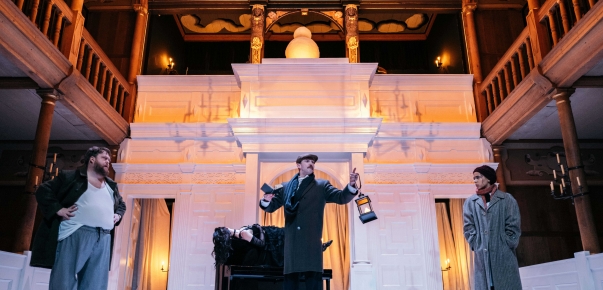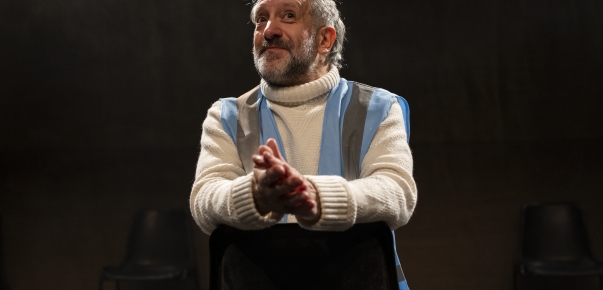Nancy Medina's keynote speech at The Stage's Future of theatre conference
8 May 2024At the end of April, Nancy Medina was keynote speaker at The Future of Theatre conference - an award-winning day-long event hosted by The Stage which discusses the most pressing issues facing the industry today.
Nancy chose to speak about the future of new writing - here's what she had to say:
“I was recently asked for an interview what the best show I’d ever seen was. My first response was: unfair question! There have been so many great productions I have seen in my life, and why they were so wonderful differed because of where I was in my life and what I took from them.
I answered that one of the best and most impactful plays I had ever seen was in NY at Primary Stages. It was a play called In the Continuum by Nikkole Salter and Danai Gurira, who both also performed in the piece. The play centers on two Black women, one in Los Angeles and one in Zimbabwe. They both find out they are pregnant and HIV positive. There is a scene where Danai Gurira ‘s character has just been to the doctor and received her news of the diagnosis, she is a mix of emotions and she steps out of the doctors office on to the streets to try and get transportation to go home. She is instantly surrounded by all these children either trying to sell her something or begging for money. She raises her arm to shoo them away saying something like’ go away – where are your parents?! And she stops. And my heart felt like it literally stopped because in that moment, I was filled with all of her complex emotions about how she felt about her present and the future, for herself and for her unborn child, the disappointment in her partner, the realization that her child’s fate could become that of these kids who she was just shooing away. Her act of making them insignificant. In that moment I saw the entire epidemic, I saw my cousin, I saw my sister’s best friend, I saw all the people in my neighborhood that weren’t around anymore, I saw the US, I saw the Caribbean, I saw Africa, I saw the world. And how we were all dealing with our personal stories but the world didn’t seem to care. It is the first time I can clearly point to a moment in theatre where I felt, I understood that through the specifics of an individual story we make impact on the bigger context of our world.
After the show, my best friend and I stayed and met the actors and were wowed that they wrote it themselves. On later research, I learnt the play came together because at university they were both creating their own one woman plays and a professor said: "hey you’re working on similar material and you should join the pieces together". In all transparency, I haven’t looked up this information, I haven’t reread the play, I’m just recounting an impactful memory-because it identifies two things for me. One: my passion for new writing. At the core of all theatre companies I’ve started over the years, the emphasis, conscious or unconscious, was about writing our lives down for the stage, writing ourselves into history because if we didn’t -would anyone even care we existed? Two: the power of individuals to create interventions for your work to breathe and exist.
At Bristol Old Vic, we have recently announced a new Literary Department, a renewed and refreshed commitment to writers at different stages of their career. Early playwriting training opportunities, writing groups and we’re thinking and developing the strategies and infrastructure on how we help to support a more robust connection to writers and development of their work. (We’ve teamed up with the brilliant Tamasha Theatre and are looking at important gaps in our knowledge, like decolonising dramaturgy and what does that mean, what is the art that we deny to audiences because we lack the skills or the lens to understand its worth).
And the question at the back of my mind and on so many others is- How do we get these scripts on our stages? How do we find their audience? How do we fund and produce this work so it can be allowed to fail, to stretch, to morph, to evolve, to challenge the artists as much as audiences?
I talk a lot about how Bristol Old Vic wants to shepherd the classics of the future. And at some point I had to be like, what do we mean by classics? What is the definition? A classic is ‘a work of art of recognised and established value’. So I then I ask myself who gets to recognize and establish this value? Another definition ‘ classics offer revelatory insight and clarity to any era’- okay I get this, a work that can speak to us a hundred years from now and we still get something out of it. Boom.
But what I get hung up on is revelatory insight & clarity. Who gets to have that? Who gets to learn something from art and who decides its clear? We all have a right to beauty, inspiration, to a communal laugh or communal cry, to deep thinking and reflection- be that linear or abstract- the opportunity for our minds and our souls to expand. We have a right to art, and to access and ignite the creativity that is in all of us. To find meaning, significance and purpose in our lives is not a luxury it’s a necessity.
I value the arts because I know what it’s done for me. I am a better person for having learned how to collaborate, how to facilitate, to communicate, to lead with empathy and kindness. But nothing in my early trajectory of life should have led me to be on this stage speaking to you today if I hadn’t had some really important interventions of key people who either opened up a path or just emboldened me to carve my own path.
This is called Writing the Future, and if you thought I was going to be talking about what the future of writing could be, all the different stories writers could come up with, the ideas I got- nope. Writers are doing their thing. The work is out there. But are we doing our thing? We who are in positions of influence, decision making, power, status- are we transforming an artists life and the trajectory of our industry? Are we writing the rules for what future of theatre can be? Cause like any capitalist system, the onus of the oppression and inequity is meant to be borne by the individual- right- that individual that needs to break their own barriers, has to make their own work- , has to find the money- and it becomes the individual’s problem and preoccupation of why their work can’t get through. Rather lets be real- it’s a system and a broken one at that – that we are ALL a part of.
I’ve articulated something for myself recently that I will share again here. As I was finding things very difficult on trying to marry my ambitions with the reality of theatre’s current financial climate - I had to reframe and say it aloud that I am working in a system that was never designed for me to work in- but a system is a set of procedures, and procedures are decided by people. And I am a person.
Writing the future is all of us, it’s all our responsibility. How do we as producers, venues, investors make meaningful space - create the infrastructure for new ideas to flourish, not pander to defunct ideas of what our audiences may want, but offer art that we didn’t even realize we needed. There are so few making decisions of what gets on stages so what is produced will always be coming from a narrow perspective of what is deemed valuable and quality. So let’s equip ourselves, let’s understand what skills we really need to have, to break down barriers. Let’s surprise even ourselves and our self-perceived sense of expertise and chase the compelling.
Theatre needs us to be bold and vulnerable. To look inside ourselves and ask how do I benefit from a system that shuts out so many? Why is it like this? And how can I be part of the deeper reflection, problem solving that can change the way we operate?
It’s a real honor to be here having this space to be able to share my thoughts with you. The key people along my life journey who made some very important interventions that opened up pathways that meant I could follow my heart and a sense of purpose - were all regular folks- family members, friends, teachers, actors, writers - but they all made space - they consciously and unconsciously helped me break down the many barriers in my way to success. To me being a part of this industry – to my voice.
I think about the little girl me who is still with me. That little girl is out there in the thousands, and I want her to know she exists and brings value to everything she does. We all bring impact and value to what we do. And I want to leave you today as you go about the rest of this conference thinking about how we can all move with integrity, generosity and heart - and how always you can move people with you. How you are all, in all your distinctive roles writing the future of theatre."
Nancy Medina, Artistic Director


